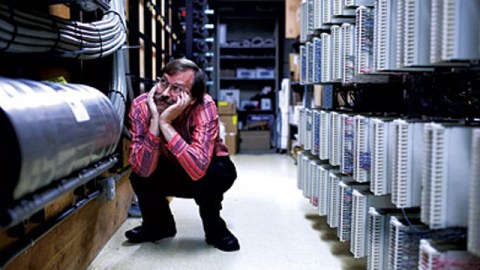Perl Founder Larry Wall Explains His Po-Mo Creation

Larry Wall, the father of Perl programming language, says that the language he created in 1987 is very “post-modern.” Like po-mo architecture, for instance, Perl “collects features from other languages, things that seem to be distinct ways of doing things, and finds a way of meshing those in a pleasing fashion—the same way a poet might take words that are very different from each other and mesh them into a coherent poem.” Thanks to Wall’s background in linguistics, Perl is also much more like a natural language than most computer languages.
In his Big Think interview, Wall explained the basics of computer programming using the analogy of cooking with a recipe. At its most basic, a computer program will first “list out various things that you’re going to be dealing with,” followed by “some instructions that say what to do with those ingredients.” Like the head chef, the programmer is in control of the overall operation, but the computer acts like a sous chef, who can be trained to do simple repetitive actions, thereby taking over “the boring bits of our thinking.”
Wall also told us the five programming languages that everyone should know, and talked about the story behind his three virtues of a programmer: laziness, impatience, and hubris. Hobbits from The Lord of the Rings really are the ideal model for successful programmers, he said. “A hobbit is lazy in a very industrious way; a hobbit is very impatient in a very patient way; and a hobbit is proud in a very humble way.”
Apple tries hard to be the arbiter of good taste, Wall says, which isn’t necessarily a bad thing. “The world would be a much poorer place without Apple as part of the cultural ecosystem, but we also need the other people who keep that from being the only way to do things. Because when good taste becomes mandatory, then it’s not really good taste any more; it’s just manners.”
And for anyone wanting to write code more like Larry Wall, he also told us about his work habits, likes, and dislikes.





